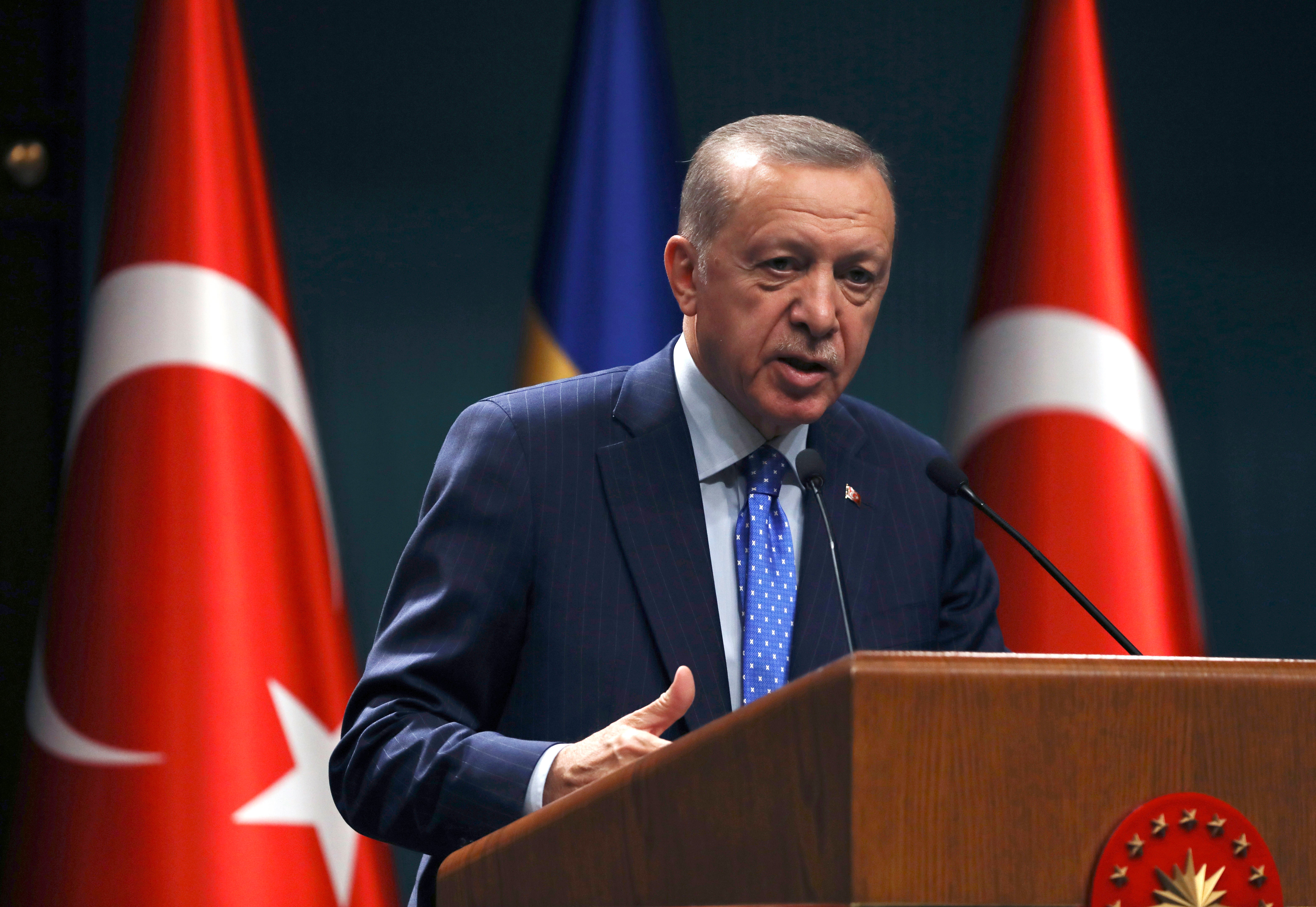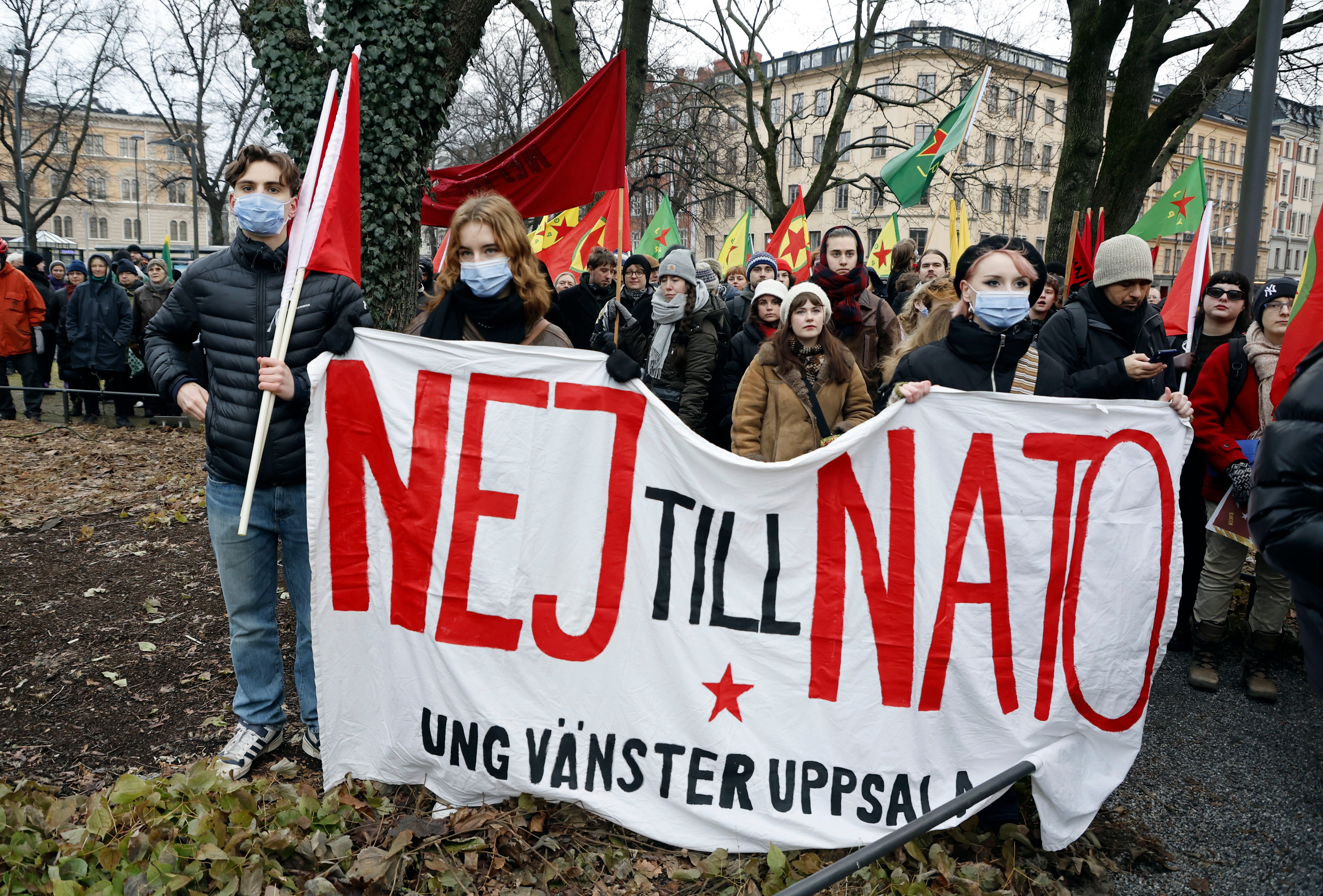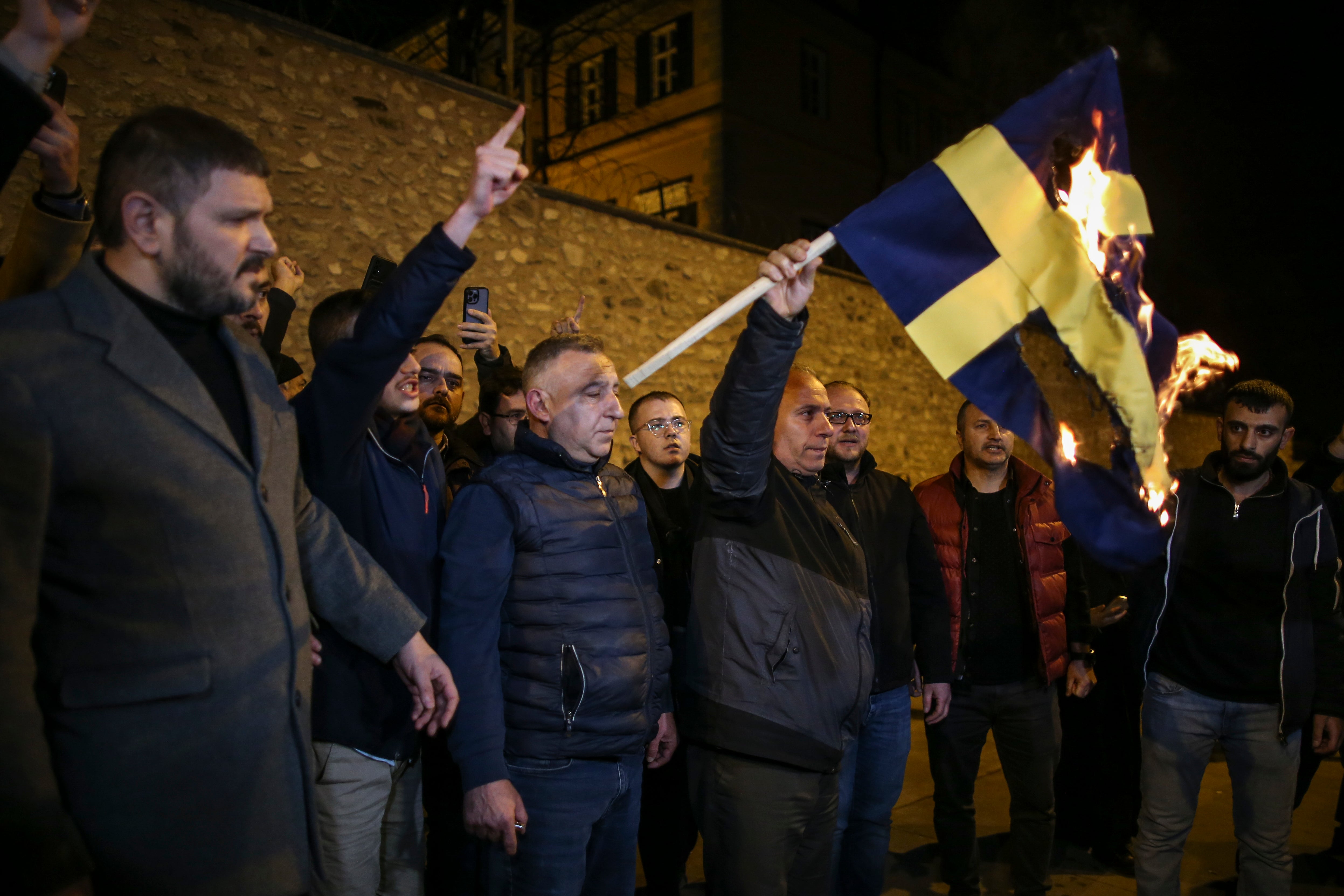Putin’s Ukraine invasion has pushed Sweden and Finland to join Nato – but Turkey is blocking it
The burning of a Quran at a weekend protest in Sweden has hardened Turkey’s resolve against an expansion of the defence alliance, writes Borzou Daragahi. It also offers President Erdogan a chance to look strong ahead of elections in May


Your support helps us to tell the story
From reproductive rights to climate change to Big Tech, The Independent is on the ground when the story is developing. Whether it's investigating the financials of Elon Musk's pro-Trump PAC or producing our latest documentary, 'The A Word', which shines a light on the American women fighting for reproductive rights, we know how important it is to parse out the facts from the messaging.
At such a critical moment in US history, we need reporters on the ground. Your donation allows us to keep sending journalists to speak to both sides of the story.
The Independent is trusted by Americans across the entire political spectrum. And unlike many other quality news outlets, we choose not to lock Americans out of our reporting and analysis with paywalls. We believe quality journalism should be available to everyone, paid for by those who can afford it.
Your support makes all the difference.Russia’s invasion of Ukraine has created a moment of existential crisis for Europe, with Finland and Sweden seeking the security of Nato membership. However, Turkey’s opposition to that expansion – as its leader faces a tight spring presidential election – threatens that plan.
Turkey has long had a troubled relationship with Sweden, worsened by the spat over Nato membership and President Recep Tayyip Erdogan’s need to look strong to would-be voters. This has taken on a whole new dimension since the burning of a copy of the Quran by a far-right politician at a protest outside the Turkish embassy in Stockholm at the weekend. Demonstrators in Stockholm last week also hung an effigy of President Erdogan from a lamppost.
“At this point I fail to see how the situation could get even worse,” says Paul Levin, an international affairs expert focused on Turkey and Europe at Stockholm University. “It’s a volatile mix of a Turkish president facing an election and needing a fight, and Swedish groups on the far right and left who may use free speech to provoke Erdogan in order to sabotage the Nato process.”
The protest at the weekend was allowed under Sweden’s free speech laws, although Ankara condemned the fact that it took place outside the embassy at all.
Sweden’s foreign minister, Tobias Billstrom, called the burning of the Quran “appalling”. He wrote on Twitter: “Sweden has a far-reaching freedom of expression, but it does not imply that the Swedish government, or myself, support the opinions expressed.” There have been protests in Turkey over the burning.
On Thursday Turkey’s foreign minister Mevlut Cavusoglu accused Sweden of being complicit in a “hate and racist crime” for failing to prevent the protests and the act by Rasmus Paludan, a politician from the marginal Danish far-right Stram Kurs [hard line] party. Mr Cavusoglu also confirmed that a key meeting in Brussels to discuss Sweden and Finland’s Nato membership has been postponed, saying such a meeting would have been meaningless in the wake of the protests.
“The Swedish government has taken part in this vile action by allowing it to take place," Mr Cavusoglu said during a joint news conference with his visiting Serbian counterpart. “It's that simple. No one can tell us the contrary.”
As Turkey faces record-high inflation and a far-reaching economic crisis, Mr Erdogan is trailing challengers ahead of the 14 May elections and has been cycling through domestic and foreign policy manoeuvres to shift the momentum.

“Every move we are seeing in Erdogan’s domestic policy and foreign policy is for staying in power,” says Ilke Toygur, a Brussels-based political scientist at the Center for Strategic and International Studies. “Any move we see from now until 14 May would be cleverly thought out to keep the government in power.”
In the past, Mr Erdogan has been able to mobilise supporters and silence opponents by positioning himself as a defender of Turkey and Islam on the world stage. The Quran burning has provided him the opportunity to shift the political agenda from the economy to the cultural wedge issues that favour him and his Islamist-rooted Justice and Development Party (AKP).
“The ugly demonstration in Sweden is an insult first and foremost to Muslims and to everyone who respects individual fundamental rights and freedoms,” Mr Erdogan said in a speech earlier this week. “The fact that this vile attack against the Quran took place in front of the Turkish embassy makes this both a religious and national issue for us.”
Turkey has long resented the visibility and activism of leftist and Kurdish separatist movements in northern and western Europe, especially Sweden, and accuses Stockholm of harbouring what it calls militants from the Kurdistan Workers Party (PKK), which took up arms against the Turkish state in 1984. The group is designated a terrorist organisation by Turkey and other nations including the US, EU and Sweden.
Nicholas Danforth, a researcher at the Hellenic Foundation for European and Foreign Policy, adds that Sweden’s entrance into Nato “would have been a difficult issue to resolve in the best of circumstances”.
“In the run-up to hard-fought elections, Erdogan is eager to exploit it for domestic political purposes. And that makes it even more difficult to resolve,” he adds.
Nato commanders had hoped to fast track Finland and Sweden’s entry into the alliance last year. But analysts and officials have hinted that further talks will probably have to wait until after Turkey’s May elections or potentially until the United States agrees on a controversial sale of fighter jets held up by Ankara’s critics in Washington.

Some Turkish officials have hinted it would be better if the two countries separated their efforts to join. However, a few days before the Sweden protests, a Finnish newspaper published a cartoon depicting an angry Mr Erodgan screaming about “terrorists”, an item republished in the pro-government Turkish dailyYeni Safak days later, with the president’s face blurred.
Asked about the possibility of Finland joining the alliance on its own, Mr Cavusoglu said Turkey had not received such a request. He said however, that “the problems we face with Finland are relatively fewer compared to Sweden”.
It is clear that Turkish leaders are also escalating their rhetoric. Devlet Bahceli, party leader of the Erdogan government’s junior coalition partner, on Tuesday likened Swedes and Finns “vikings” with the same “cowboy mentality” as Americans.
Intransigence, tensions and ambivalence over Nato membership are nothing new. Athens used its veto power to hold up North Macedonia’s bid to join the alliance until the country renamed itself to distinguish the nation from Greece’s Macedonia province. Both Sweden and Finland declined entreaties to join and revelled in their neutrality for much of the Cold War and afterward, even if they cooperated with Nato and shared intelligence with western partners.
Some in Washington are openly calling for Turkey’s Nato membership to be suspended, along with that of Hungary under its Kremlin-friendly prime minister Viktor Orban. While there is no formal mechanism for expelling a nation from Nato, even moderate voices within the transatlantic security establishment have warned Turkey about its stance.
“At some point soon, some Nato members are going to begin asking, ‘If it is a choice between Sweden/Finland and Turkey, maybe we should look at our options,’” former Nato supreme allied commander James Stavridis said in a piece for Bloomberg. “That would be a mistake.”
Erdogan supporters already are trying to use Quran-burning for domestic political advantage. On Wednesday, a writer for Yeni Safak accused possible presidential challenger and Istanbul mayor Ekem Imamglu of potentially supporting terrorism for failing to forcefully condemn the act.
“He mentioned those benefiting from the grave assault while not condemning the provocative terror acts and the burning of the Quran,” columnist Bulent Orakoglu wrote. “It could be considered to support the terror state Sweden and terrorism that Imamoglu did not condemn them along with the despicable provocateur Paludan.”
Elections aside, it is clear that Turkey’s anger and resentment toward Nato and the West remain real, palpable and widespread. Turks of all political stripes continue to smart over moves by former German and French leaders to derail Turkey’s European Union bid at the end of the 2000s. The continued collaboration between Western military powers and Syrian Kurds affiliated with the PKK continues to anger Turks.
“He [Erdogan] has always believed that the West needs Turkey more than Turkey needs the West,” says Mr Danforth. “The anger at the way Sweden has handled Turkish issues is real. What works for Erodgan is that so many people see what he is doing as defending Turkish interests.”
Mr Erdogan is also pursuing Turkey’s interests at a time when he believes the country is optimally positioned to maximise its diplomatic and financial clout. Ankara maintains cordial ties with both Moscow and Kyiv at a time when the two countries are at war. Turkey hosts the operational headquarters of the crucial UN-backed effort to get Ukrainian and Russian food from Black Sea ports to the world markets.
“Ultimately Erdogan holds the trump card, because any state can veto enlargement,” says Mr Levin. “At some point there’s going to be tremendous pressure on Turkey. But there’s always a concern that if you put too much pressure on Turkey it would turn to Russia.”



Join our commenting forum
Join thought-provoking conversations, follow other Independent readers and see their replies
Comments